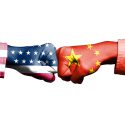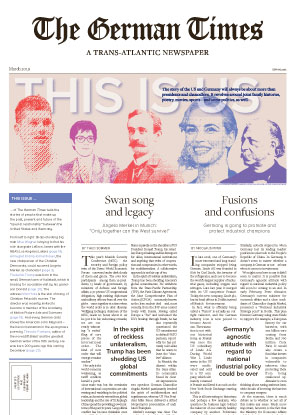Germany is going to promote and protect industrial champions.
In late 2018, one of Germany’s most venerated and long-standing companies stopped being German. Linde AG was founded in 1879 by Carl Linde, the inventor of the refrigerator, and rose to become the world’s largest supplier of industrial gases, including oxygen and nitrogen. Late last year, it merged with its US competitor Praxair. Today, the new company, Linde plc, has its head offices in Dublin instead of Munich – for tax reasons.
In fact, what is officially being called a “fusion” is actually an outright takeover, and the German industry icon is now poised to become American. The transaction is not without Historical irony, as Praxair was once the US subsidiary of Linde AG. During World War I, Linde assets in the US were confiscated and sold to a US company, which ultimately renamed it Praxair and listed it as such on the New York Stock Exchange starting in 1989.
This is all interesting to historians and perhaps a few analysts, who question the business logic behind the takeover of one entirely healthy company by another. Politicians and the public, however, rarely take interest in the matter, which is not surprising. After all, the question of whether a company is “German” is usually irrelevant in Germany – the world’s export leader – as long as the jobs stay in the country.
The idea of fostering “national champions” has been a foreign concept in German politics for many years. When Siemens (Germany) and Alstom (France) sought to merge their rail operations in an attempt to create a European champion of railway technology, the European Commission disallowed the merger over concerns as to how it would aff ect competition. There was very little protest to this decision, except among those directly aff ected.
Similarly, nobody stepped in when Germany lost its leading market position in solar tech to the People’s Republic of China. In Germany, it doesn’t seem to matter whether a company is German or not – at least when it comes to investments.
We might soon have to say it didn’t seem to matter. It is possible that Germany’s agnostic attitude with regard to national industrial policy will soon be coming to an end. In early February, Peter Altmaier, Germany’s current minister for economic aff airs and a close confidante of Chancellor Angela Merkel, presented a “National Industrial Strategy 2030” in Berlin. This plan foresees Germany using state funds to support, for example, a European factory for car batteries, with one billion euro coming from Berlin and 700 million from Paris. It would also create a fund that invests in companies vulnerable to takeover, thus protecting them from being swallowed up. Altmaier is even thinking about easing antitrust laws, with the aim of lowering the barriers to company mergers.
At the moment, there is much debate as to whether or not all of this makes any sense. Much more important, however, is the fact that the Ministry for Economic Affairs published such a paper in the first place. Since the days of Ludwig Erhard, West Germany’s first postwar economics minister and the architect of its “economic miracle,” stewards of the German economy have consistently promoted – in theory, not always in practice – a classic, economically liberal position; that is, decisions with regard to investments are made by companies, not politicians. It would appear that this is about to change.
There are three clearly identifiable reasons for this paradigm shift. First is the presidency of Donald Trump in Washington. His aggressive rhetoric against German export surpluses, his threats with regard to punitive tariffs and the prospect that German automobile imports could be declared a danger to US national security – have come as a shock to Germans. The country’s most important ally is no longer a benevolent hegemon standing for shared values; instead, it is a rude competitor that uses its political power to gain economic advantages for itself. In fact, if negotiations on Praxair’s takeover of Linde were being held today, it is unclear whether German politicians might attempt to block the deal.
The second force behind the shift in opinion in Berlin is the scandal surrounding manipulated diesel emissions. Since 2015, when it was revealed in the US that Volkswagen had installed illegal defeat devices in its diesel models in order to meet the official limits for nitrogen oxide emissions, “Dieselgate” has been one of the most discussed topics in Germany. Volkswagen already paid a fine of $4.3 billion to the US, with a number of lawsuits on behalf of motorists in several countries still pending. Stuttgart and other German cities have even had to impose driving bans on diesel cars for some roads.
The diesel scandal rocked the very core of the German auto industry, which had until recently been the pride of the country. Is it possible the industry is facing massive technical and economic problems? In Germany, more than 820,000 people are employed in the development and construction of automobiles, contributing 7.7 percent to the gross domestic product. The suspicion plaguing Germany’s general public today is that the industry has missed the boat on important technical trends and might, for example, no longer play a meaningful role in battery technology development for electric cars, which is exactly where Altmaier has called for action.
The third and perhaps most important reason for the novel involvement of politicians in the German economy is the rise of China or, more precisely, a changed assessment of that country’s economic ascent. Until recently, Germans have only benefited from China’s successes. The People’s Republic is Germany’s most important trading partner, ahead of both the Netherlands and the US. For 2018, the total volume of trade with China reached €200 billion, with Germany exporting goods worth €93 billion euro to China and importing goods totaling €106 billion. No other European country enjoys a position comparable to Germany’s status in China. Today, however, an increasing amount of skepticism is diluting that enthusiasm. After all, the Asian giant remains a communist dictatorship and continues to pursue an aggressive foreign policy increasingly characterized by the aspiration to achieve dominance. In the context of the fundamental shift toward the digital age, this behavior serves to cause anxiety and fear.
The first wake-up call that prompted Germany to rethink its policies toward China was the Kuka case. In 2016, the Augsburg based industrial robot manufacturer was sold to the Chinese Midea Group. Prior to that, Sigmar Gabriel – a Social Democrat and then-minister of economic affairs – had tried in vain to prevent the deal and shield Kuka’s strategically important robot technology. Now the technology is gone, and Kuka might even become a victim of the current Chinese-US trade dispute; as the economic climate worsens, Chinese industrial companies are buying fewer robots.
More and more Germans are worried about issues that go beyond the possible loss of a key technology. Concerns about data protection and national security are on the rise. In this realm, the focus is on the Chinese tech giant Huawei, the second-largest provider of mobile phones worldwide. Huawei is currently expanding its market strength in Europe at a rapid pace. Deutsche Telekom, for example, is an important Huawei client. Huawei equipment is also set to play a key role in the expansion of Germany’s infrastructure for the new generation of 5G mobile communications; that is, unless the federal government intervenes at the last moment and puts a stop to Huawei’s plans.
And this is precisely what the US government would like to see happen. Officials in Washington fear that when push comes to shove, China could use Huawei components as tools of espionage. Meng Wanzhou, Huawei’s CFO and daughter of the company’s founder, was arrested recently in Canada on a warrant from the US.
Concerns over the loss of data security as a result of the use of Chinese technology are likely justified, especially considering the nonchalance with which the Beijing government uses the data of its citizens to carry out comprehensive surveillance. For European governments eager to protect their own citizens’ freedoms, it would not be wise to give Huawei unprotected access to sensitive data. However, in light of the aggressive behavior exhibited by President Trump, it looks like these legitimate concerns might also be used as weapons in a Chinese-US battle for supremacy over the technology of the future.
This is the backdrop against which Germany’s minister for economic affairs is now attempting to intervene in industrial policy – an approach that is very unusual in the country’s economic history. Still, one of Altmaier’s areas of concern is right on the nose: no new global corporations and no world market leaders are emerging in Germany anymore, or, for that matter, in the EU. The only exception to this rule is the Walldorf-based software company SAP. Almost all other globally operating companies in Germany can be traced back to the early days of industrialization: Siemens, Daimler, Thyssen-Krupp, Bayer, BASF and even Deutsche Bank. Moreover, countless names have disappeared over the course of the years: AEG, Hoechst and Grundig. Until recently, Germany had hoped to facilitate the growth of new companies by means of improved framework conditions. Now, however, a hands-on industrial policy is being set up to accomplish that task and generate some European champions.
But does this approach make sense? There is indeed one shining example of successful European industrial policy: Airbus. But that company required a large amount of time and money to become a serious player on the global aircraft market. Only in 2001 – more than 30 years after it was founded – did the European corporation sell more planes than its US competitor Boeing. But the digital age doesn’t provide companies with as much time as that. For this reason, Peter Altmaier’s industrial policy initiative could easily go down in history as one of the many missteps made in these uncertain times.
Nikolaus Piper
has been a business editor for the Süddeutsche Zeitung and reported for many years as a New York correspondent.




